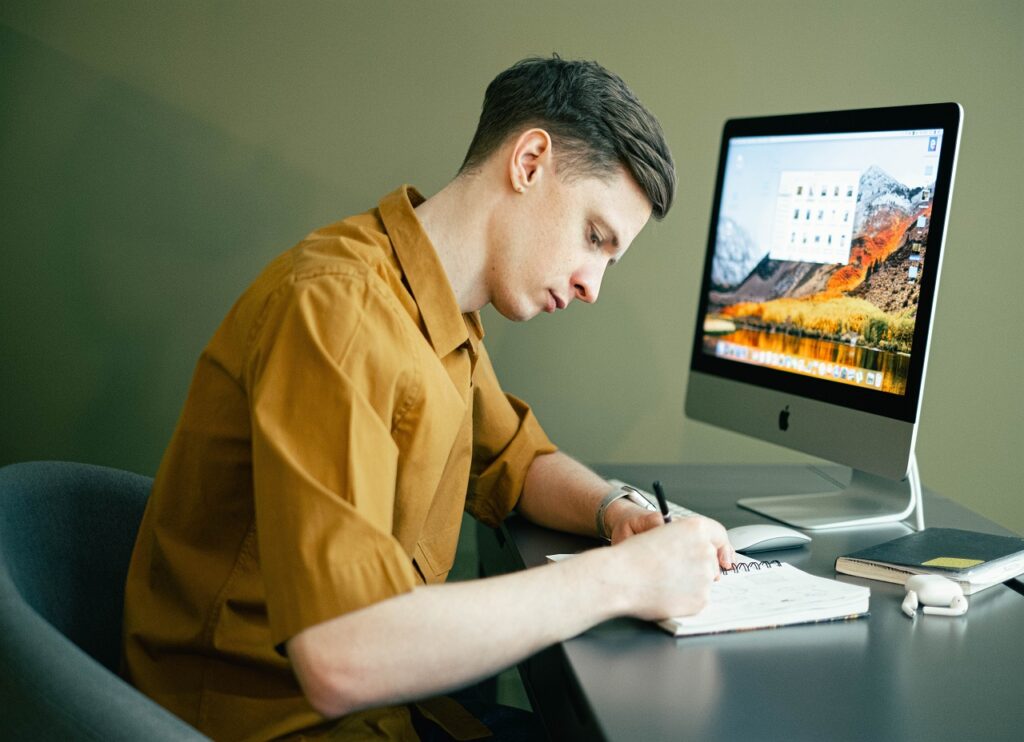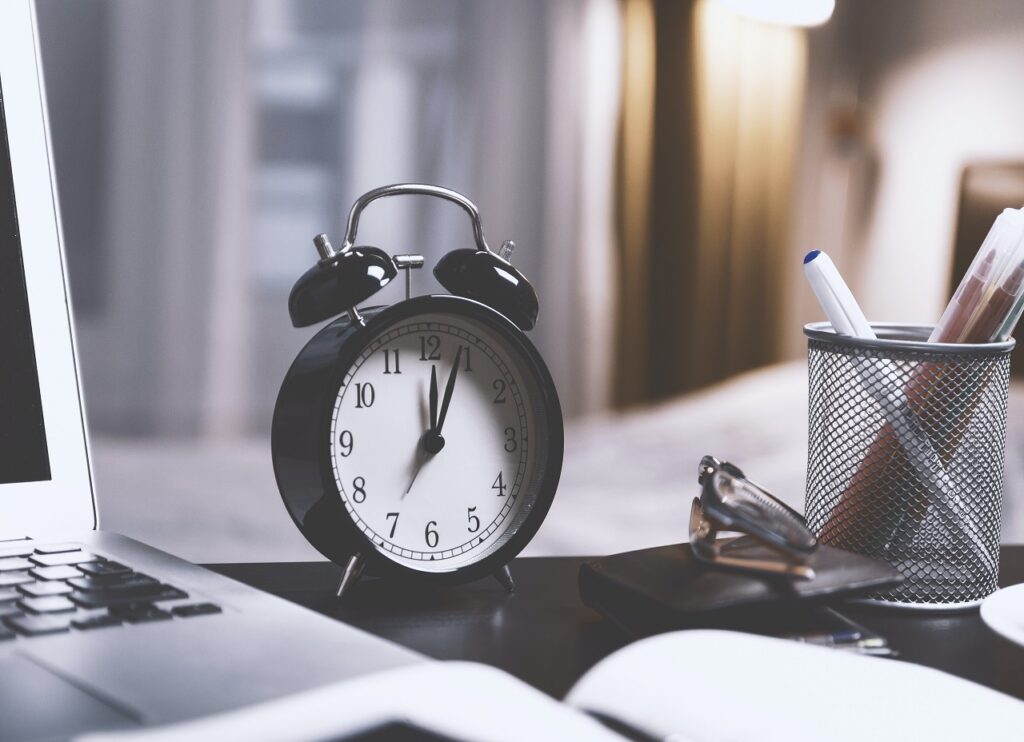1. Have a “no notepad” policy.
Anything that can wait until tomorrow should be pushed back to tomorrow. No exceptions unless it’s an emergency! With the notepad policy, you won’t always have to worry about coming up with something to do when you’re bored because there will always be something that needs to be done.
2. Keep your work area clean and organized for maximum efficiency.
A first step to reduce distractions and time-wasters is an organised desk. A disorganized, cluttered area will make you spend more time looking for things you need and waste time spent on being indecisive on where to put something away. It is also a good idea to have a “to do” pile if it helps you get things out of your head.
3. Find a good place to work.

A comfortable, well-lit area that isn’t too noisy or cluttered will allow you to be productive for longer periods with minimal distractions.
4. Take off headphones when not listening to music.
Putting on headphones is often associated with wanting to be left alone or needing more focus, so it’s best not to wear them unless you need the extra isolation.
5. Don’t multitask.
Doing multiple things at once may seem like a good idea since you can get more done, but studies show that multitasking doesn’t work and is less productive than doing one task at a time. When working, focus on one thing and do it well to get the best results possible.
6. Get into work mode before starting to work.
Just getting started won’t always help you be more productive, so get into an “in the zone” mindset by focusing on your goals for the day.
7. Work for no less than an hour at a time
Work for no less than an hour at a time, and no more than 2 hours if possible.
Working in longer intervals allows your mind to rest after concentrating on something too long. You can also save the remainder of the workday to do other things you’ve been putting off or simply relax after working hard.
8. Take regular breaks to reduce burnout and increase creativity.
Breaks not only help your mind focus better, but they can also help you think about things from an outside perspective and come up with ideas you wouldn’t have thought of before.
9. Use timers if necessary.

Using a timer will make you more conscious of the amount of time you have been working and just how much is left. It will also help motivate you to work quickly to take a break.
10. Limit distractions by having designated “distraction times” throughout the day.
Doing this allows you to get all your distractions out at once so that you don’t have to waste more time later on finding something else to do.
11. Do things in batches if possible.
Doing this will reduce the amount of time wasted by constantly having to search for things and make cleaning up a lot easier too! For example, washing all your dishes instead of one by one will save a lot of time.
12. Set goals and deadlines for you to stay motivated
Set goals and deadlines for yourself to stay motivated, and also add incentives if necessary.
Having goals will motivate you to work hard to meet your deadline or reach your reward while adding incentives adds an extra bit of encouragement to get things done faster!
13. Make a “to do” list to prioritize your tasks
By having a to-do list, you can see what needs to be done first while also being able to mark things off as they are completed so that it makes it easier to figure out what comes next.
14. Prioritize high-priority tasks over low-priority ones.
To do this, you can add numbers or stars to certain items on your list to prioritize them if necessary. This saves time wasted deciding what has to get done first and what could wait a few extra minutes/hours/days depending on the task.
15. Plan out your day and week in advance.
Organizing your day and week ahead of time allows you to know what needs to get done and when without having to waste time deciding what to do next. It will also give you a sense of direction on how you should be spending your time on any given day or at any given moment, as well as any other necessary decisions you might need to make.
16. Put your most important task(s) at the top of your list
for the day.
Doing this will motivate you to get those tasks done first since they are more urgent, and it also saves time by not having to worry about what needs to be done next or if it is even the right time to do them.
17. Limit multitasking as much as possible

Limit multitasking as much as possible, and try to focus on one task at a time.
Studies show that multitasking doesn’t work, so completing tasks properly is more likely when you focus on that specific task by itself.
18. Save social media as a “distraction time” as much as possible.
Doing this allows social media to be used as a reward for working hard on something else first and gives you a bit of fun after getting everything done! It also helps you remember that there is more to life than just social media.
19. Have a set bedtime and time to wake up
Have a set bedtime and time to wake up, and adhere to it as much as possible.
Having a set bedtime is not only good for your sleep cycle, but it also helps you be more productive during the day by being well-rested. Also, having a set time to wake up in the morning allows you to have an easier schedule with less time wasted trying to decide when you should get out of bed.
20. Do things the way they work best for YOU
Do things the way they work best for YOU, even if it is unconventional or not what others do.
If you have a certain way that works best for you, it will allow you to be productive and waste less time doing it since you are used to a specific way of doing things.
21. Stay away from all distractions as much as possible
Stay away from all distractions as much as possible, especially ones that tend to waste a lot of time.
Procrastination is one of the biggest issues people have when trying to stay productive, so by staying away from certain distractions; you can avoid falling into bad habits and wasting extra time here and there.
22. Use a timer to help you focus
Use a timer to help you focus and know when to switch tasks so that you don’t get burnt out.
Setting timers allows you to know when you should take a break and can be used as a way of reminding yourself not to fall into bad habits and continue working hard! It also helps save time, so you don’t get burnt out or spend too much time on one specific thing.
23. Don’t let yourself get distracted

Don’t let yourself get distracted by thinking of all the other things you should be doing at any given moment since it will just waste more of your time and energy while feeling overwhelmed instead of focused.
24. Have clear goals in your life
Have clear goals in your life to have a better sense of direction when trying to figure out what needs to get done.
Having clear goals gives you a purpose in life and lets you know your priorities when deciding how to spend your time. This also helps save time since you won’t have to worry about wasting it on something that wasn’t important, to begin with.
25. Prioritize sleep
Getting enough sleep is essential if you want to get things done since it helps refresh your mind and body, which will allow you to focus better on what needs to get done!
26. Have a list of your errands and tasks to complete
You are more likely to waste time figuring out what needs to be done next, which can easily be solved by just having a list of things you need to accomplish! If the task is important enough, it should go on your list. Otherwise, it can be saved for later.
27. Do meaningful things
Do things meaningful to you so that you don’t feel like your time was wasted doing something unimportant or not enjoyable.
Getting things done can be draining, especially if it is something you don’t enjoy, so taking the time to do what makes you happy will help motivate you and help you look forward to getting things done.
28. Procrastination can be a big time-waster
Procrastination can be a big time-waster, so try your hardest not to put things off until later or tomorrow because you will usually realize it isn’t important enough to take up your time.
Procrastinating wastes a lot of time since you have to keep going back and trying to get work done, which can put off the task and waste more time trying to do it later.
29. Be proactive instead of reactive
Be proactive instead of reactive; this will help you get things done before they become a problem or crisis.
Reacting is usually not as effective as being proactive since you have nothing planned out, and all your energy is going towards dealing with the emergency.
30. Make sure your days have a good flow to them
Make sure your days have a good flow to them by planning out your day and time-management skills in advance to avoid wasting time on the go.
Time management is hard when you don’t plan since it is easy to get overwhelmed and waste a lot of time instead of doing what you need to get done.
31. Have a set time for doing things
Have a set time for doing things, such as studying or readings, so that you don’t feel overwhelmed and procrastinate instead of getting productive work done.
Setting specific times for these tasks will help motivate you to get them done on time since, if not, they might cut into your other important tasks.
32. Be organized
This would help you avoid wasting time looking for lost or misplaced things when they could have been found much faster if everything had a set location, to begin with.
Being organized can save a lot of time because it helps keep everything where it belongs and prevents the need to go searching for anything.
33. Have a planner or organizer to help you stay on track
Have a planner or organizer to help you stay on track and make sure nothing gets forgotten since it is easy to forget important tasks or appointments without something set in your schedule or location for this information.
Planners are great because they can have everything all in one place where you can reference when needed; this will help you avoid wasting time checking multiple sources for something that can easily be found in your planner.
34. Keep track of the time you spend on each task
Keep track of the time you spend on each task to know how efficient it was and if there are ways to improve or speed up the process in the future.
This will help keep track of which tasks, errands, homework, etc., were more time-consuming and which ones took less time; this will help you figure out a better system for keeping track of your tasks in the future.
35. Exercise can help with focus and concentration
Exercise can help with focus and concentration, so try to do some physical activity if you need to make sure something gets done because it is hard to concentrate on other things if you are tired.
Exercise is great for your mind and body by relieving stress and focusing on what matters instead of whatever responsibilities you have to take care of.
Conclusion
Do you want to reduce distractions and time-wasters? When trying to get work done, it can be difficult to avoid distractions. From Facebook notifications and Twitter DMs to emails coming in from your boss or even an angry customer, there seem like no end of things that might derail us from our goals for the day. If you find yourself struggling with this as well, we’ve got some tips on keeping those time-wasters at bay so you can focus on what is important – reducing distractions and minimizing time wasters! With these 35 Tips to Reduce Distractions and Time Wasters, we hope to help get stuff done a little bit easier (and maybe more enjoyable too!)



